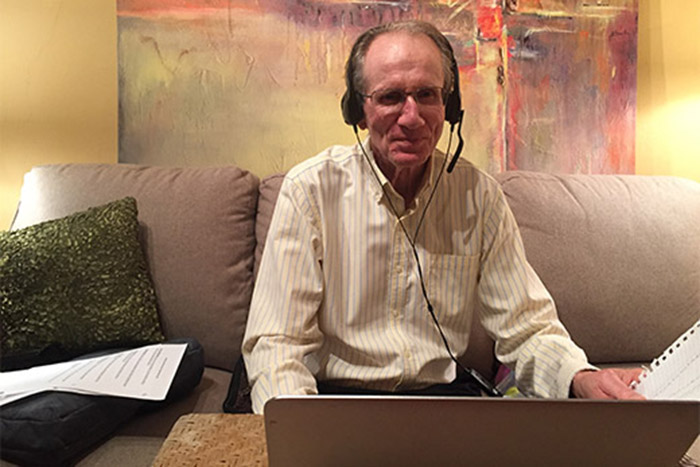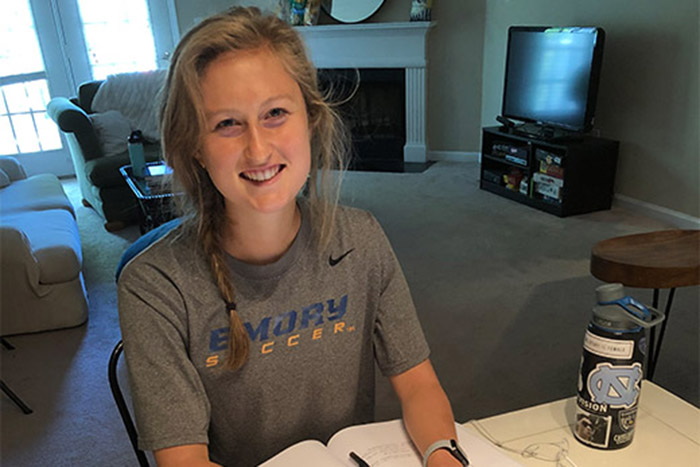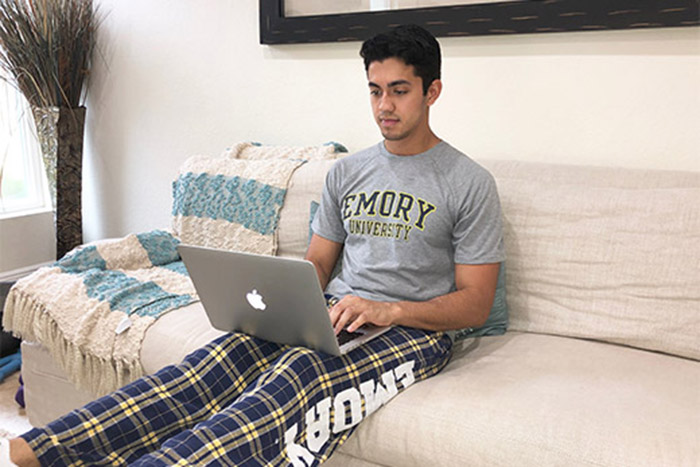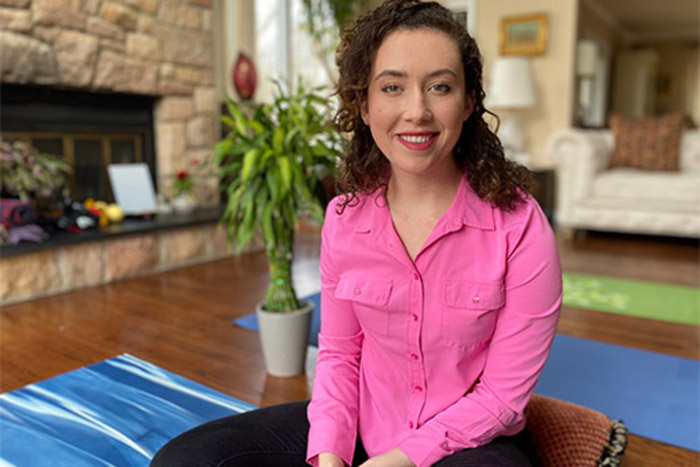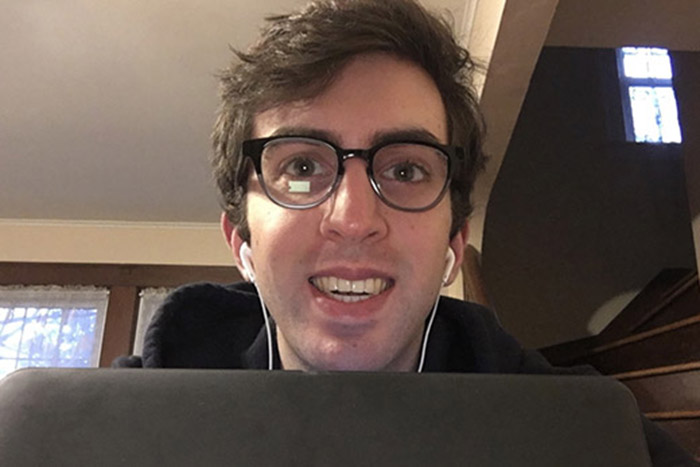Once Caroline Wilkinson learned she would be completing her senior year remotely, she set to work establishing her new learning environment – which led to transforming the living room into a yoga, meditation and contemplation space for her family. Meanwhile, psychology professor Stephen Nowicki learned how to incorporate remote technology into class for the first time in his 50-year career at Emory. He soon realized that the technology was more than a channel for continuing class. It also provided a way for him to still see and interact with the students he missed so much.
“Classes that Click” is a series showcasing how Emory’s commitment to stellar education continues during the COVID-19 pandemic and how many lessons learned will further enhance life at the university when everyone returns to classrooms together.
Nowicki, Charles Howard Candler Professor of Psychology Emeritus, shares how he found new ways to connect with and encourage his students. Nowicki is joined by several seniors from his class at Goizueta Business School: Morgan Brandwie, Pamela Niditch, Alejandro Sanchez, Caroline Wilkinson and Bobby Wilson.
The course: “Psychology of Leadership” (Organization and Management 434)
“Psychology of Leadership” (OAM 434) introduces students to what is known about relating to others in personal, social and business situations, particularly the ways strong relationships foster leadership competencies and professional acumen that can be brought to bear in driving organizational change.
Moving toward remote learning
How did you prepare for this phase of remote learning?
Niditch: I have used Zoom before so I felt confident with this platform. I created a space where I can be uninterrupted during the class and made sure that my sound and video were working properly.
Brandwie: I am staying in my apartment off campus with my roommates. We did a big haul grocery shopping to limit the amount of times we would have to go to public spaces. We also have begun taking our Zoom classes in our rooms, while we normally do homework together at our kitchen table.
Wilkinson: I tried to move my corner desk to the center of my room so I could have a more aesthetically pleasing background on Zoom. When this did not work, I cleaned all around my desk to create a sense of “novelty” in my new learning space. I emailed my professors pretty extensively, asking how I would get research papers and group projects done.
What was one of your primary challenges in shifting to a remote format and how did you meet it?
Nowicki: I had to learn about remote teaching technology. I had a terrific teacher, Stephanie Parisi (associate director of instructional design for Gouzueta), who was very supportive and clear.
Niditch: I find it very helpful when professors write notes or outline the lecture on the board in class. Over Zoom it is a little bit harder to do this. Yet, Zoom’s share screen function allows the professor to share his notes/PowerPoints with us, which helps to replace this.
Sanchez: One challenge is being motivated to attend lectures and to learn diligently like I would in person. It takes a lot of will and mental preparation in order to carry out remote classes since there are a lot of distractions at home. I try to motivate myself and be productive. I like to wake up early mornings and exercise in order to get an active start to the day.
Wilkinson: Like most people, I can get easily distracted by texts, emails and the internet. Usually in class I work hard to keep my learning restricted to a pen and paper to minimize distractions. Now I set my computer to “do not disturb” all day, which helps me stay focused for classes and studying.
Wilson: Adjusting to a new routine wherein I never leave my house has been my primary challenge. While it would presumably make things easier, quarantine has made it hard to stay positive and motivated. I’ve established a semblance of routine to follow every day. I also designated areas in the house for work and for recreation; keeping work and play separate has made me more productive.
Putting remote learning into practice
What has been a pleasant surprise about remote learning?
Nowicki: Without applying the technology, I might never have seen my students again. I was very emotional when at the starting time for my class their video squares began to pop up all over my computer screen like the stars blinking into light at night. All I could think about and say for the first few moments was how very, very good it was to see them.
Sanchez: I didn’t expect the remote learning platform to have advanced features such as the ability to create breakout rooms. I have used them to interview candidates for coaching roles in the business school. I also know others have used this feature for small group discussions and activities during class sessions, which demonstrates how it can foster learning given the circumstances.
Wilkinson: My professors have done an excellent job of incorporating current events into our class discussions. They understand we are going through extraordinary circumstances. Dr. Nowicki, for example, reminds us that we have not yet technically ended our college careers, and urges us to connect with important people in our lives.
Wilson: I’ve found paying attention in Zoom classes to be easier than in in-person classes. You’re focused primarily on your environment and that of the person speaking. Additionally, professors have distilled the most important points into shortened class times, making it easier to pay attention.
How are you staying engaged with your students or classmates and professors?
Nowicki: I send out messages to students almost every day about one thing or another. Because one of the essential elements of becoming a leader is learning how to end relationships well, I have asked students who have taken in class in years past to write letters of advice and support to the present class. The response has been overwhelming and I think it helps the present students realize they are not alone in dealing with this crisis and that there are things they can do to move forward.
Brandwie: I have increased email communication with my professors and my classmates to relay schedules and submit homework. One of my professors has us submit a diary entry every week to reflect on how we are handling quarantine.
Niditch: I have been video chatting a lot with classmates for school purposes but also to catch up, as many classmates are all over the world right now.
Lessons to be carried forward
What’s one lesson you’ve learned during this transition, and how will you use it later?
Nowicki: To be more open to technology.
Brandwie: I am a very type-A person and I like to live a scheduled life. However, this transition has taught me the benefits of being adaptable and living in the moment. Being flexible can actually prove to be an advantage. In addition, I will remember to never take anything for granted. I will remember how easily things can change and to not wait for the future to do something I can do today.
Wilkinson: Dr. Nowicki told our class that a crisis occurs when something happens and you cannot use what you did before to address current needs. In a crisis, you have to develop new ways of doing things. I remind myself that this crisis is an opportunity to learn about myself and to lead. By doing this, I will be better prepared for future crises. When I am back in a normal classroom, I will not take the gift of sitting with people for granted. Being physically connected with people, free from computers, with the opportunity to learn, will be a sacred experience. I will be mindful of that and grateful.
Wilson: To be grateful, for stability and the important people in our lives. I’ll be sure to savor in-person moments and practice gratitude daily. It also wouldn’t hurt to thank people in person whenever I get the chance.
In addition to focusing on the university’s educational mission, Emory experts are on the front lines of the pandemic – caring for patients, researching possible treatments and vaccines and sharing knowledge to help inform and prepare the public. Visit Emory’s COVID-19 page for the latest updates.

